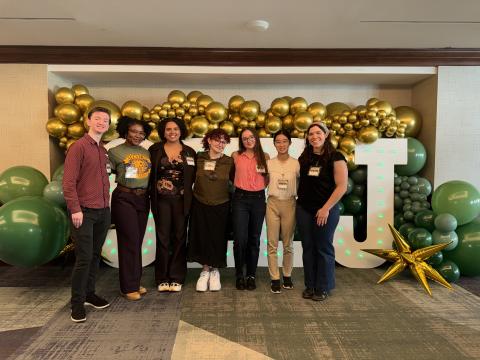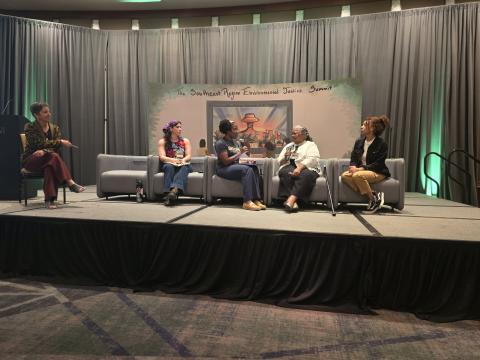

From June 13- 16, 2025, several interns from Georgia Tech SCoRE’s Summer Internship program had the opportunity to attend the Southeast Environmental Justice (SEEJ) Summit, held at the Omni Hotel in Atlanta’s Centennial Park. From the opening sessions to the final workshops, the summit brought together community leaders, policymakers, students, and advocates to engage in powerful dialogue around justice, climate resilience, and community self-determination. The experience left us informed and deeply motivated to carry this work forward with renewed focus and commitment. Keynote speakers gave powerful calls to action that centered strategy, clarity, faith, and love.
“Now is the time to huddle and strategize. We must be prepared with coalitions, research, and vision.” — Mayor Van Johnson, Savannah, GA
“We have to feel sincerely and deeply about this work. By claiming power in spite of pain, we can stand up for communities that have been erased from the maps.” — Dr. Estella Shabazz, Savannah City Council
As an intern with Integrated Solutions, LLC, which coordinated the Summit, Olivia Guarinello had the powerful opportunity to support the Summit’s planning and execution. For her, every panel carried weight, every speaker echoed truth, and every moment served as a reminder of why this work matters. Olivia reflected that It became a living exchange of ideas, strategies, and stories, preparing us to endure through a rapidly changing world and policy landscape.
“...as someone who grew up on a Superfund site, connecting with other attendees who had been impacted by environmental injustice was cathartic and deeply meaningful.”- Olivia Guarinello
One highlight was the SCoRE Decarbonization Workshop, Coming Soon to a Neighborhood Near You: A Community-based Approach to Industrial Decarbonization. This workshop was led by Alexandra Rodriguez Dalmau (Graduate Research Assistant at SCoRE) and Jennifer Hirsch (Senior Director of SCoRE) and included a panel discussion led by SCoRE’s summer interns, Jada Lane and Mersie Watkins, with Romona Taylor-Williams, Executive Director of Mississippi Communities United for Prosperity (MCUP). This space offered different perspectives from organizers to researchers. The dialogue was rich, challenging and grounded in real-world applications that inspired those engaging to raise questions and take actions in their communities. This conversation exemplified the importance of developing partnerships and building strong relationships. It highlighted the importance of obtaining knowledge of unfamiliar technologies and understanding their effects for community benefit. The workshop allowed participants to immerse themselves in thoughtful conversations, highlighting diverse reflections of their communities to bring awareness to industrial decarbonization community advocacy.
In the workshop, Decoding Local Zoning, Omar Mohammed, a former zoning officer, emphasized the importance of zoning and how it impacts communities. Attendees were empowered with tools and knowledge to better understand zoning processes and learned how to advocate for meaningful community involvement in land-use decisions.
“I loved how Omar emphasized that density is not our enemy, and it can be a powerful tool for keeping people in their communities while achieving environmentally oriented goals.” - Samuel Barnett, interning with Clean Cities Georgia.
Another standout was the Disaster Preparedness and Resiliency workshop, which blended personal storytelling with technical experience. It reminded us that resilience is more than infrastructure. It’s about knowledge sharing and preparation rooted in equity and inclusion.
“Attending SEEJ was educational and inspiring. I especially appreciated the workshop on digital advocacy for nonprofits - something directly related to my internship. Seeing so many people still passionate about this work inspired me to continue my path in environmental science and policy.” - Annie Lin, interning with the Center for Sustainable Communities.
The summit sessions reflected a deeper emotion and determination to continue the Environmental Justice work throughout the Southeast region and beyond. As we return to our work with SCoRE and other community organizations, we do so with greater purpose, clarity, and a deeper sense of responsibility.
